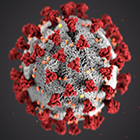Editorial Addresses Diagnostic Dilemma of Lymphadenopathy in COVID-19 Vaccinated Patients
 An editorial published in Radiology: Imaging Cancer addresses the concerns and diagnostic dilemma of vaccine-induced lymphadenopathy in patients. The authors write that as more countries roll out mass vaccinations, “lymphadenopathy ipsilateral to the injected deltoid muscle has become an important manifestation of an immune response to be aware of as it may present as a diagnostic dilemma on cancer imaging studies.”
An editorial published in Radiology: Imaging Cancer addresses the concerns and diagnostic dilemma of vaccine-induced lymphadenopathy in patients. The authors write that as more countries roll out mass vaccinations, “lymphadenopathy ipsilateral to the injected deltoid muscle has become an important manifestation of an immune response to be aware of as it may present as a diagnostic dilemma on cancer imaging studies.”
In cancer patients with a history of malignancy, the palpable lymphadenopathy commonly involving the axilla as an immune response to vaccination could be misconstrued as a sign of malignancy, leading to unnecessary nodal biopsies and patient concern. The authors further report that axillary swelling or tenderness was reported in 11.6% of patients who received the Moderna COVID-19 vaccine in clinical trials after the first does and 16% of patients after the second Moderna vaccine. Reports of lymphadenopathy in patients after receiving the Pfizer-BioNTech COVID-19 was also noticeably higher in the vaccine group (64) versus the placebo group (6), although this was not solicited as an adverse event during the Pfizer clinical trials.
At least 20 articles have been published regarding COVID-19 vaccine-related lymphadenopathy with the majority (18) published in imaging journals, most notably in the field of breast imaging. The authors cite guidelines from the Society of Breast Imaging and the journal Radiology recommending non-urgent routine surveillance, screening or staging imaging be scheduled either prior to COVID-19 vaccination or at least six weeks after the final vaccination dose. Any urgent imaging exam should not be delayed, however, regardless of vaccination status.
“Widespread patient education on the vaccine-induced lymphadenopathy is needed,” the authors wrote.
Related Articles
Citation
Editorial Addresses Diagnostic Dilemma of Lymphadenopathy in COVID-19 Vaccinated Patients. Appl Radiol.
April 9, 2021